Did you know you can take your Mandarin to the next level by watching films? That’s right. Here are 23 great Chinese movies to learn with — there’s something for everyone!
Seeing movies is one of the most popular ways of spending free time among people worldwide. The complicated plot lines, heart-breaking scenes, and well-written dialogues often keep the person watching engaged for hours on end.
Some people use it as a time to relax and relieve the stress from their busy schedules. While others watch it every instance, they get (not something to be guilty about).
Regardless, people do not realize that this easy task could be of great use in a very productive manner.
You have many excellent motivations to learn Chinese. For example, reasons to study in China, new career prospects, and cultural aspects.
Movies can be an incredible way to learn a language. Films often reflect the culture, lifestyle, tradition, and language of a country in its rustic and basic form. Plus, they portray the day-to-day lives of the people living there.
Thus, it gives a better insight into the culture than reading about it in a book or internet. But, of course, this also applies to learning the Chinese language.
Table of Contents
- Why is watching films great for learning Chinese?
- 23 Best Movies to Learn Mandarin
- 1. To Live (活着 / Huózhe) — 1994
- 2. Mulan (花木兰) — 2020
- 3. Crouching Tiger, Hidden Dragon (卧虎藏龙 / Wò hǔ cáng lóng) — 2000
- 4. A Beautiful Life (不再让你孤单 / Bù Zaì Ràng Ní Gū Dān) — 2011
- 5. This Is Not What I Expected (喜欢你 / Xi huan ni) — 2017
- 6. House of Flying Daggers (十面埋伏 / Shí Miàn Mái Fú) — 2004
- 7. Big Fish and Begonia (大鱼海棠 / Dàyú Hǎitáng) — 2016
- 8. Happy times (幸福时光 / Xìngfú Shíguāng) — 2000
- 9. Last Train Home (归途列车 / Guītú lièchē) — 2009
- 10. Up the Yangtze — 2007
- 11. You Are the Apple of My Eye (我们一起追的女孩 / Na Xie Nian, Wo Men Yi Qi Zhui De Nu Hai) — 2001
- 12. Getting Home (落叶归根 / Lùo yè gūi gēn) — 2007
- 13. The Road Home (我的父亲母亲/ wǒde fùqin mǔqin) — 1999
- 14. Raise the Red Lantern (大红灯笼高高挂 / Dà Hóng Dēnglong Gāogāo Guà) — 1992
- 15. The Story of Qiu Ju (秋菊打官司 / Qiū Jú dǎ guānsi) — 1992
- 16. The Blue Kite (蓝风筝 / Lán fēngzheng) — 1993
- 17. Suzhou River (苏州河 / Sūzhōu Hé) — 2000
- 18. Together (和你在一起 / hé nǐ zài yì qǐ) — 2002
- 19. Beijing Taxi (北京出租 / běi jīng chū zū chē) — 2010
- 20. Lost in Thailand (人再囧途之泰囧 / Rén Zài Jiǒng Tú zhī Tài Jiŏng) — 2012
- 21. Farewell My Concubine (霸王别姬 / bàwáng bié jī) — 1993
- 22. Let The Bullet Fly (让子弹飞 / Rang Zi dan Fei) — 2010
- 23. Secret (不能说的·秘密 / Bùnéng shuō de·mìmì) — 2007
- Final Words on studying Chinese with films
Why is watching films great for learning Chinese?
There are several advantages of learning Mandarin with films.
Watching a movie in the Chinese language would introduce and help get acquainted with the native speech. Because filmmakers aim movies at native Mandarin speakers who are already fluent in the language.
The Mandarin language structure and flow in the movie would be realistic instead of being textbook and formal.
Historical or fantasy films may not always accurately reflect current speech patterns. But most contemporary films use everyday language that the audience will understand.
You would more likely understand the actual dialogue in context if you listened to an authentic, native speech portrayed in the Chinese movies.
The Mandarin films help you get used to those tricky accents, tones, honorific sounds, and pronunciations. You also know various dialects and common informal and conversational exclamations and phrases.
Also, vocabulary usage in Chinese movies is very context-based instead of a dictionary or a textbook. So, grasping what’s going on, you won’t have to rely solely on the words themselves.
If you don’t understand a word, you would usually make presumptions or guesses based on what’s going on. And also as per visual indicators such as character facial expressions. These all help significantly with learning more and more words.
You can examine how terminology is employed in various contexts, which can help you know when different terms are acceptable. Finally, you can engage yourself in a pictorial view of unique Chinese customs and society.
The best part is that it is a fun way to study difficult Mandarin. It would not bore you viewing Chinese movies for hours on end. It is way more joyful than sitting with a conventional approach and memorizing words or sentences.
Watching movies also engages the auditory and optical senses at once. As a result, it is easy to remember, as our minds focus more and retain the knowledge that we find interesting.

Where to see Chinese cinema?
The internet and online streaming offer many Chinese movies, television series, and dramas to get you started.
OTT media services like Amazon Prime Video, Netflix, YouTube Premium, Baidu video, and others allow you to watch many Chinese movies.
You can also view the legit repository of Chinese titles on many websites at your comfort. Besides, Netflix and a few other platforms produce many original and exclusive programs for their more big audience.
23 Best Movies to Learn Mandarin
One of the fastest movie industries globally, Chinese film production makes tons of good Mandarin movies every year.
The Chinese film industry produces many good Mandarin films. But, it’s hard to find relevant movies to watch.
Here are 23 fabulous movies that would help beginners, intermediate, and advanced learners study and improve their language skills in Chinese.
1. To Live (活着 / Huózhe) — 1994
“To Live” should be at the top of anyone’s list of the best Chinese movies. It highlights the changes occurring in families during this turbulent time.
The flick also depicts everything from comedy to heartbreak, birth to death, and everything between.
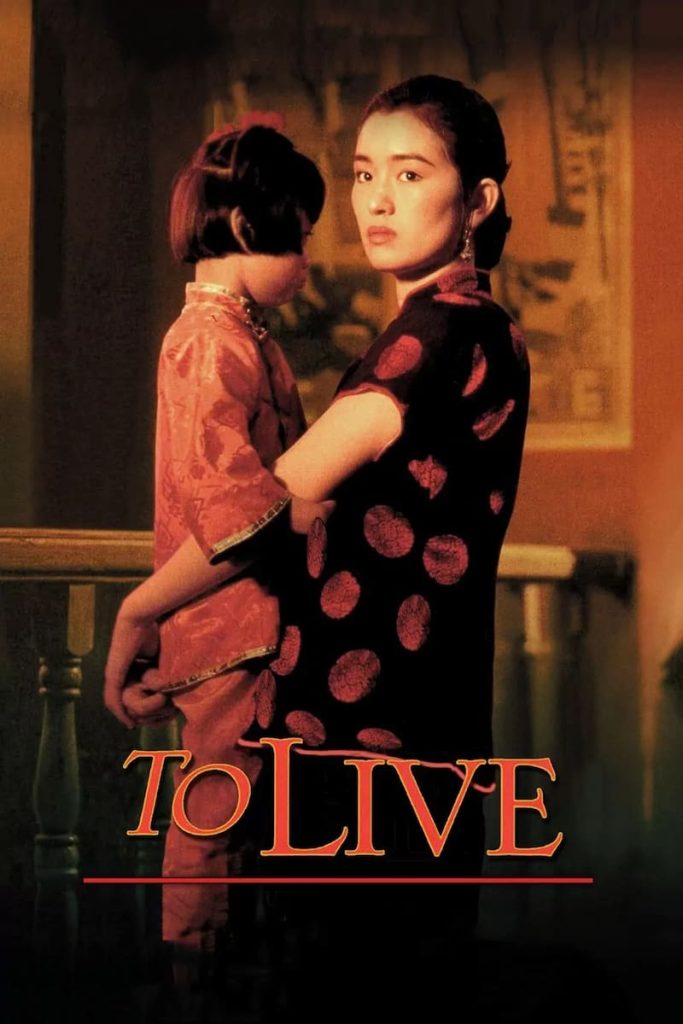
This is a culturally rich film with unique advantages for Chinese students. Also, the dialogue is usually easy enough for intermediate-level Chinese learners. You can follow with or without subtitles.
2. Mulan (花木兰) — 2020
Mulan is one of the most well-known Disney princesses. However, a movie was also released in 2020 in the Chinese language.
When Mulan’s father is called to be a part of the army because of war, he cannot go due to his illness. Mulan takes his place and impersonates herself as a male soldier. She must conceal her true identity and battle in the army to defend her nation.
This film may not teach you much about the Chinese language or pick up too much vocabulary. Still, it is a terrific method to understand more about Chinese legends and myths, history, culture, and filial piety, which are sacred in Chinese culture.
3. Crouching Tiger, Hidden Dragon (卧虎藏龙 / Wò hǔ cáng lóng) — 2000
Directed by internationally acclaimed director Ang Lee in 2000, Crouching Tiger, Hidden Dragon is a period movie. It was set in the 19th century.
This is one of the most captivating films in the Wuxia genre (a Chinese literature genre that depicts the exploits of ancient Chinese martial artists).
This film is based on Wang Dulu’s novel of the same name, published in 1942. It’s a touching romance about a 19th-century Qing Dynasty warrior and his love interest.
Each of the four characters talks with a different Chinese accent is one of the most intriguing parts of the picture. This movie can benefit you if you aim for a higher Mandarin HSK level.
4. A Beautiful Life (不再让你孤单 / Bù Zaì Ràng Ní Gū Dān) — 2011
Peiru (Shu Qi) meets Zhendong (Liu Ye), who uses his savings and helps her start a business. Unfortunately, he is later fired and has a brain injury due to his actions. Zhendong leaves, but Peiru follows him despite his memory loss.

They marry and start a family in the countryside. She takes up a part-time job at an office to help support them while living with his brother and family.
The movie helps with understanding Chinese society and the issues it faces. The language is also relatively simple to follow, making it an excellent flick to learn the basics of the language.
5. This Is Not What I Expected (喜欢你 / Xi huan ni) — 2017
Although the Chinese title translates to “I like you,” it was released in 2017 with ‘This Is Not What I Expected.’
Based on the novel ‘Finally, I Get You’ by Lan Bai Se, this movie is an excellent introduction to contemporary Chinese humor. Also, it has some remarkable instances of how the language is employed in everyday situations.
This amusing chick flick is worth your time if you want to learn how to order at a Chinese restaurant or how love couples communicate in China. This is one of the top Chinese movies to learn Mandarin.
6. House of Flying Daggers (十面埋伏 / Shí Miàn Mái Fú) — 2004
This 2004 martial arts film features some impressive battle scenes. It is a beautiful example of Chinese cinematography at its finest. Plus, the dialogue between the characters is very poetic for an action film.
If you are a more advanced Chinese learner and desire a career in the Chinese language, you can pick up some elegant lines. This can make your Chinese sound sophisticated.
Remembering Chinese idioms can be difficult. But linking them with Chinese films is a fun and straightforward approach to recognizing them.
7. Big Fish and Begonia (大鱼海棠 / Dàyú Hǎitáng) — 2016
This animated movie shows the story of Chun and her quest to save Kun, a human child who saved her life and lives in her world as a dolphin. They released it in 2017.
The artwork, narrative, and unpredictable plot create a compelling world vision, including humans, non-humans, and living and dead people.
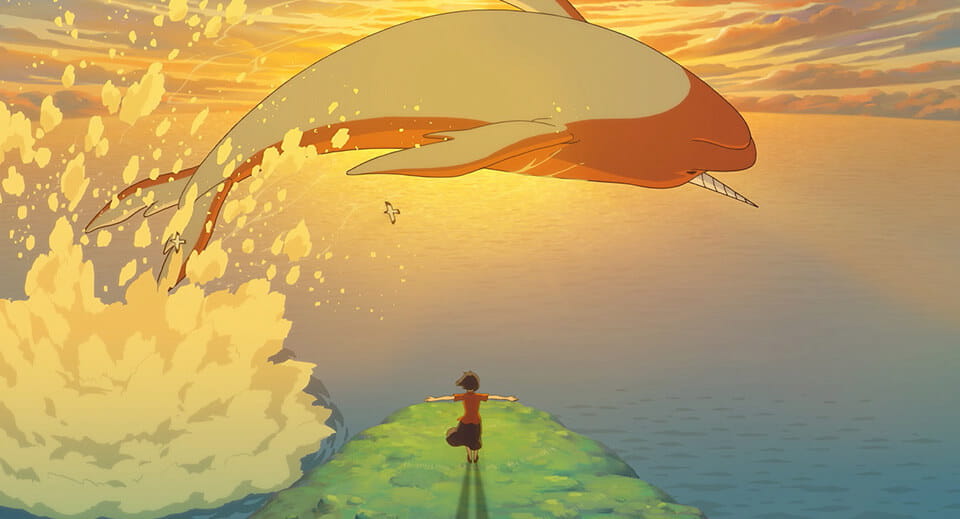
The script uses simple Chinese phrases but is quite touching and touches on some philosophical themes. It will have you thinking long after the credits have rolled.
8. Happy times (幸福时光 / Xìngfú Shíguāng) — 2000
“Happy Times” is an unusual comedy with a hilarious story. As with many Chinese films, you can expect it to be goofy and ridiculous for being goofy and silly, but note that it’s also reasonably mature.
The characters are a strange bunch of retired buddies who set up a faux hotel in an abandoned warehouse and hire a blind girl to work in the “hotel” with good intentions.
It may be difficult to concentrate on the language spoken between the laughter, but it will be worthwhile. This one is ideal for learning light-hearted conversation and daily romantic and friendly terms.
9. Last Train Home (归途列车 / Guītú lièchē) — 2009
“Last Train Home” is a fantastic look at one of the most fascinating and crucial aspects of modern Chinese life: trying to get home for the holidays. It revolves around a physically and emotionally torn apart family by the need to relocate to large cities to find jobs.
The main characters speak with a thick dialectal accent that makes it tricky to understand. Still, the film imparts at least one crucial lesson about China: don’t travel by train around the Chinese New Year.
This movie has a lot of help related to languages like transportation, commercial jargon, and family dynamics. This is an excellent film to learn Mandarin.
10. Up the Yangtze — 2007
“Up the Yangtze” depicts the massive impact the Three Gorges Dam project has on people varying across classes. It shows the story of a family whose home will flood because of the dam’s construction.
Surprisingly, the family’s daughter finds work on a river cruise ship. The other lead is a famous young worker eager for new chances but lacks the values and traditions others own.

Many Chinese learners are bound to have dialogues with native speakers about personal and cultural changes. This makes for a terrific learning experience.
11. You Are the Apple of My Eye (我们一起追的女孩 / Na Xie Nian, Wo Men Yi Qi Zhui De Nu Hai) — 2001
You Are the Apple of My Eye is a coming-of-age romance film based in Taiwan, released in 2011. It is based on the semi-autobiographical novel of the same name by Taiwanese novelist Giddens Ko.
Michelle Chen plays Shen Chia-Yi, a popular and top student. Ko Chen-tung plays Ko Ching-teng, a troublemaker and mischievous student who eventually becomes a writer.
The plot follows the two main characters and their friends and family on their journey through life, from high school to beyond.
The movie has a straightforward language, making it easy for beginners to follow and learn from. And if you wish to pass the Taiwan-based TOCFL exam, you cannot afford to miss it.
12. Getting Home (落叶归根 / Lùo yè gūi gēn) — 2007
“Getting Home” is a classic Chinese comedy film released in 2007. It follows the story of a man named Zhao who owes a favor to his close friend and co-worker.
The friend expresses his dying wish to be buried in the Three Gorges region. So Zhao, although poor, travels across the country carrying his dead friend. And in the process, he meets people from all walks of life, giving him insight into their struggles and stories.
The deep story made light-hearted with comedic elements makes it a must-watch. Besides, they kept the language simple and easy enough for beginners to follow.
13. The Road Home (我的父亲母亲/ wǒde fùqin mǔqin) — 1999
“The Road Home” is a quiet, charming love story set in rural China around fifty years ago. The story follows a young couple through their lives. Still, the majority of the story is set when they are children.
The Chinese language learner will benefit from there aren’t too many characters. The tale is simple to follow, and the old couple’s son provides some narration.
As a result, it’s simple to piece together the story. In addition, the film has excellent images and a soundtrack that keeps you engrossed throughout.
It also allows Chinese language students to experience life in rural China before the Cultural Revolution’s modernization with none of the above themes.
14. Raise the Red Lantern (大红灯笼高高挂 / Dà Hóng Dēnglong Gāogāo Guà) — 1992
This classic 1991 film depicts China’s cultural development and changes during the early 20th century.
The plot revolves around the interactions of four spouses in a wealthy man’s household. They are occasionally amicable but more frequently envious and manipulative. The narrative is fascinating, especially as the plot unfolds and the film reaches a spectacular conclusion.
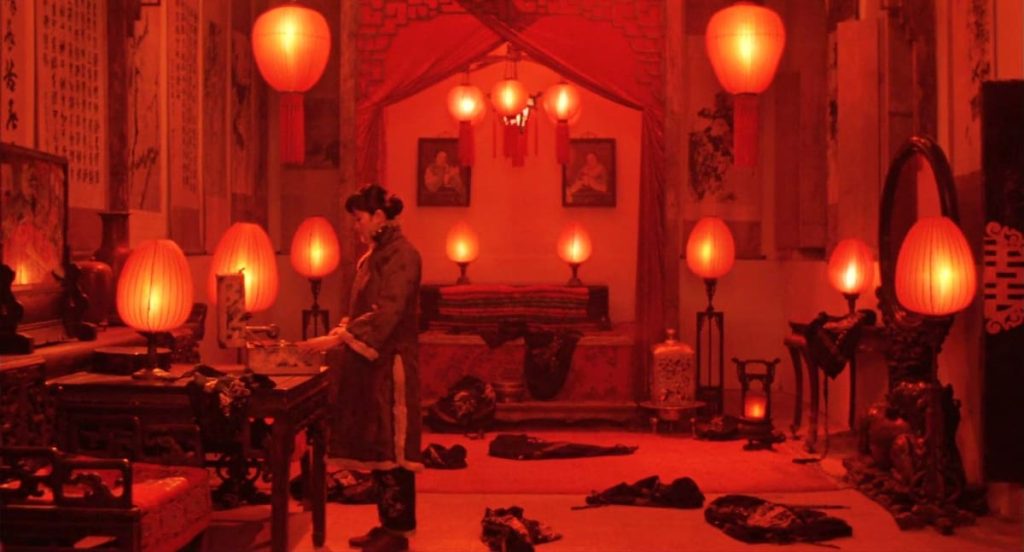
The film’s character depth and cultural aspects are a go-to learning point for the learners. The terms and flow will also help with easy Chinese language learning.
15. The Story of Qiu Ju (秋菊打官司 / Qiū Jú dǎ guānsi) — 1992
In this movie, a determined woman seeking justice travels to the city while pregnant to pursue a case against the man who injured her husband.
She appeals her way up the system, but the results are, at best, irritating. All she wants is an apology, but the culprit is adamant about not apologizing.
This film is excellent for students because the language used is more like ordinary people than movie script lines. Yet, it will be perfect practice for advanced students. It also does an outstanding job of portraying China in the early 1990s through documentary-style street scenes.
16. The Blue Kite (蓝风筝 / Lán fēngzheng) — 1993
Various Chinese families describe their changing experiences during the Cultural Revolution in this movie.
In this film, the story is narrated by a young boy, Tietou. He is the central character and has a charming personality that makes viewers relate to him. While growing up, he has to deal with three different fathers.
Conversations between the child and his family members are a big part of Blue Kite (Lan Feng Zheng). Further, the communication that happens among adults is easy to grasp. It is an incredible movie for learners who are studying to speak Mandarin.
17. Suzhou River (苏州河 / Sūzhōu Hé) — 2000
In a contemporary Shanghai setting, the film tells a tragic love story. This engaging story of love and obsession covers identity, neediness, and wishes.
Shanghai’s Suzhou River, which flows through a rapidly expanding city, is a reservoir of dirt, debris, chaos, and poverty. It is a place where memories, secrets, and unknown mysteries meet.
Many international film festivals and events have recognized it with awards and nominations. This film was also well-received overseas, though it was initially not screened in mainland China.
If you want to improve your Chinese language through “real cinema,” this is a flick you should keep on your list of favorites.
18. Together (和你在一起 / hé nǐ zài yì qǐ) — 2002
This film is a story of a man who wants his son to succeed as a violin player. Together portrays typical Chinese thinking that success usually comes through huge sacrifice and intense focus.
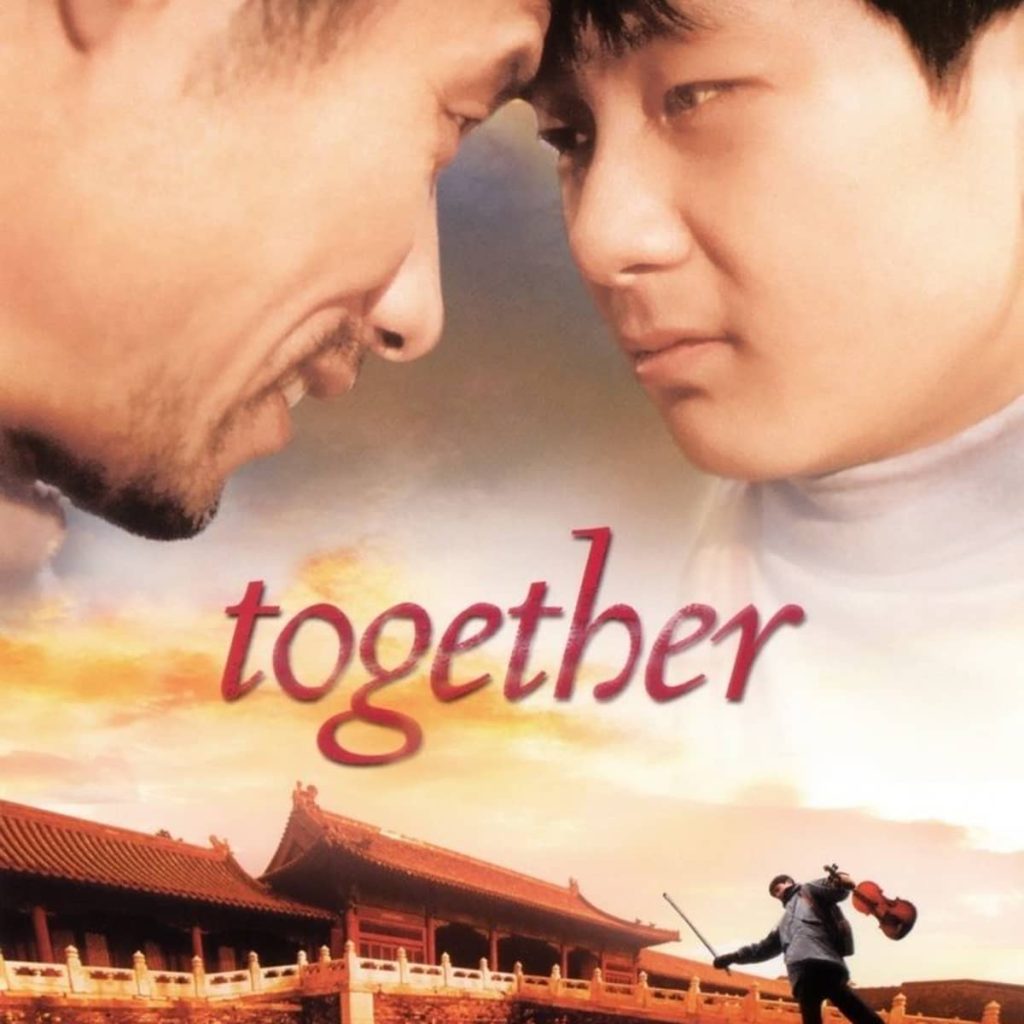
The man moves to Beijing with his son for the boy to participate in a music contest. But, sadly, the hardworking father often puts his son’s match above their own relationship.
The relationship between the child and his violin teacher is absolutely humorous and fun. “Together” gives us a glimpse of the challenges faced by so many Chinese who move to big cities.
19. Beijing Taxi (北京出租 / běi jīng chū zū chē) — 2010
In Beijing Taxi, three taxi drivers followed through Beijing in 2008, just before the Beijing Olympics. The city changed dramatically during that time.
The words of these three individuals reflect the demolition of many old neighborhoods to make way for Olympic facilities. Yet, despite the changes they cannot control, it looks at hardworking people’s everyday lives.
It is likely that most Mandarin learners are already familiar with the Beijing accent, especially if they have spent time listening to audio lessons. Such lessons typically include this northern dialect of China.
20. Lost in Thailand (人再囧途之泰囧 / Rén Zài Jiǒng Tú zhī Tài Jiŏng) — 2012
Directed by Xu Zheng and starring Xu Zheng, Wang Baoqiang, and Huang Bo, Lost in Thailand is a 2012 Chinese comedy.
Scientists Xu and Bo traveled to Thailand searching for their boss, who lived in a Buddhist temple. They wanted to be the first scientist to get a patent and market a new chemical additive.
While going, Xu meets a pancake sales agent named Wang, who came from Beijing. He wanted to achieve many dreams in Bangkok as a tourist with no experience in traveling.
Following some comic turn of events, both form a team and locate Xu’s boss in Thailand. The story is simple and makes comedy even more enjoyable.
21. Farewell My Concubine (霸王别姬 / bàwáng bié jī) — 1993
Based on the novel written by Lillian Lee, The Farewell My Concubine is a historical drama film directed by Chen Kaige. They are set in the middle of the 1800s and come from Hong Kong.
An opera starring two of Beijing’s most renowned opera male stars and a charming woman coming to separate them is the subject of this story. It also tells the story of political instability in China and its effects on families, groups, and individuals.
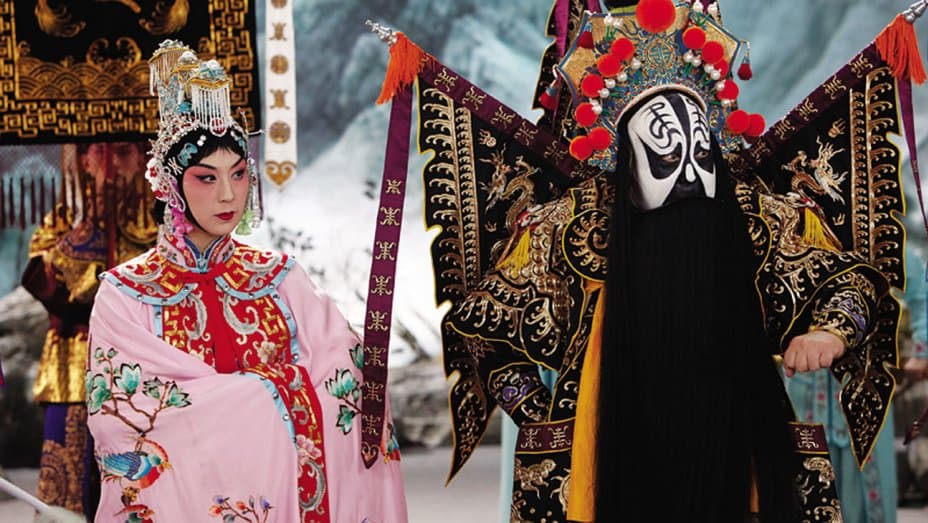
This flick has put the Chinese language on the international scene. In this historical setting, the acting is outstanding, and the visuals are spectacular.
It is a fantastic movie for Chinese learners who plan to appear for the Mandarin Proficiency exam.
22. Let The Bullet Fly (让子弹飞 / Rang Zi dan Fei) — 2010
Let the Bullet Fly is a western comedy flick packed with many action scenes.
The story narrates a group of thieves who lay in an ambush on a train. They did all this to fight against a different group of bandits. Sadly, while the film feeds a high level of entertaining humor, the spoken Mandarin dialect is hard to hold for beginners.
Only advanced language learners can comprehend it better. Thus, this film will be helpful if you intend to appear for the Level V or VI of the Chinese HSK test.
23. Secret (不能说的·秘密 / Bùnéng shuō de·mìmì) — 2007
“Secret” is a witty, romantic, delightful, and lively Chinese cinema released in 2007. Featuring Jay Chou as the protagonist, this time-spanning film delivers a strong punch and a great feeling for learners.
Secret reveals a haunting and powerful love saga of a young and energetic piano student who falls into a rebellious love with an adorable and mysterious girl.
Thanks to the uncomplicated Mandarin dialect used in the movie, the language is easy to grasp. And if you are a lover of classical music, you will like the pleasing soundtrack in the background.
Final Words on studying Chinese with films
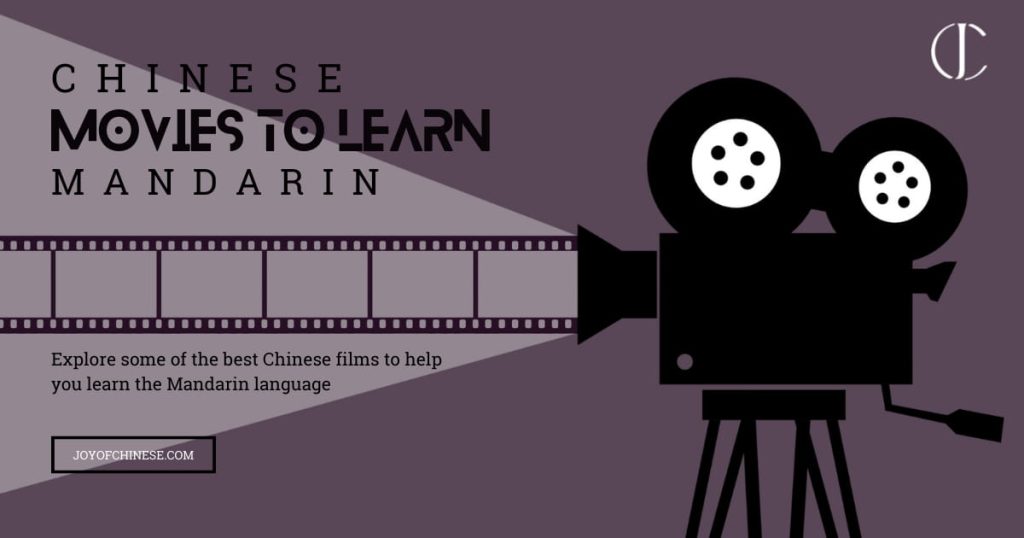
Watching Mandarin movies is a great way to learn the Chinese language.
That was the list of 23 Chinese movies that are sure to be a stepping stone on your journey of learning the language and culture of China. While I could not list all top-rated and popular ones, these can be a perfect start for your best Mandarin learning tools.
With the proper focus and time investment, things as fun as films can be a great learning opportunity. So get on to it and let the fun begin!
If you want more recommendations and further information, please feel free to ask us in the comments below.









I will go to China 🇨🇳 1 day.
I want to study Chinese please help me
Join any learning center or find a teacher. Alternatively, use some resources like books, podcasts, apps, etc.